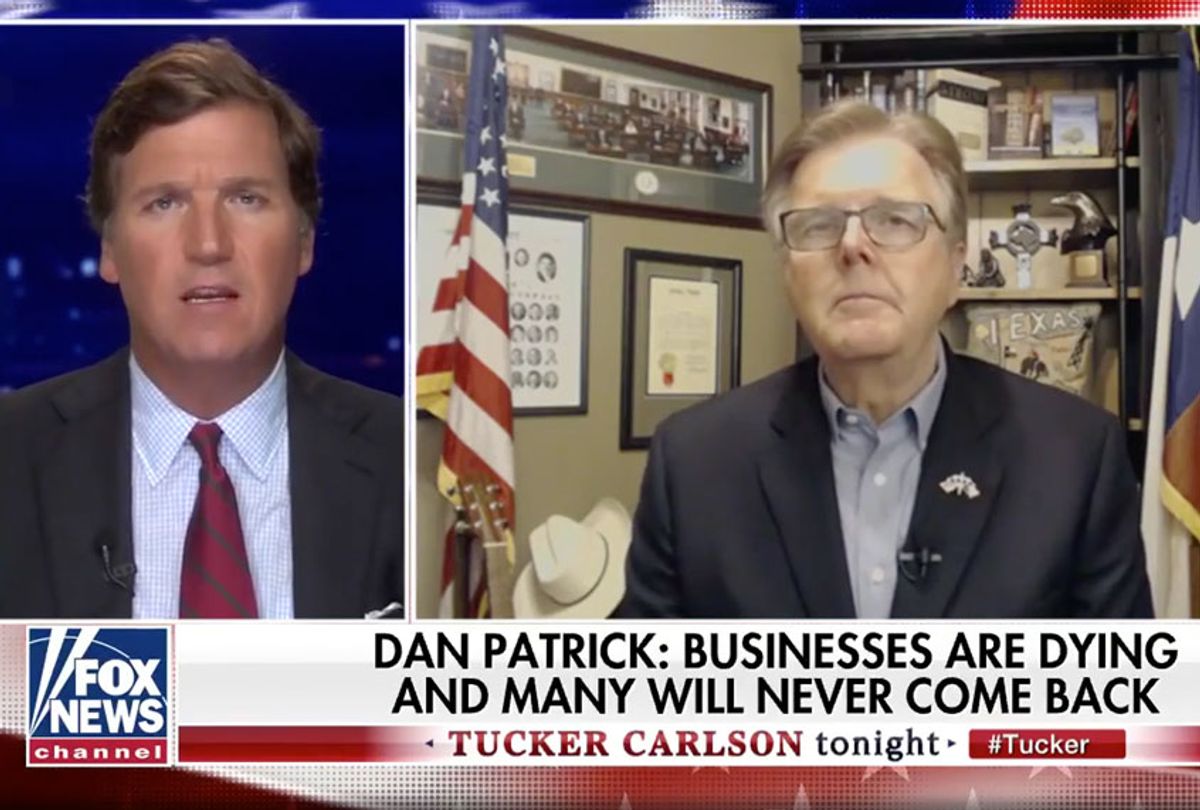Lt. Gov. Dan Patrick said Friday that efforts to expand mail-in voting during the coronavirus amount to a "scam by Democrats to steal the election" and claimed that people under 65 are at more risk of dying in a car wreck on the way to vote than they are from dying from the new coronavirus because they voted in person.
"There is no reason — capital N, capital O — no reason that anyone under 65 should be able to say I am afraid to go vote," Patrick, a Republican, said in an interview with Fox News. "Have they been to a grocery store? Have they been to Walmart? Have they been to Lowe's? Have they been to Home Depot? Have they been anywhere? Have they been afraid to go out of their house? This is a scam by the Democrats to steal the election."
Texas has been locked in a legal fight over whether it has to expand who is eligible to vote by mail during the coronavirus pandemic. Democrats and multiple voters have sued the state, saying it's dangerous to require people to wait in line and cast ballots on machines shared with other voters while the virus is spreading. GOP state officials have opposed the effort, however, saying that mail-in voting is vulnerable to fraud.
Patrick repeated those worries about fraud Friday while also dismissing any fears people might have about going to the polls if they aren't eligible for a mail-in ballot. Patrick noted that the vast majority of people dying from the virus are older. Currently in Texas, anyone 65 or older or with a disability is eligible for a ballot.
"This idea that we want to give you a disability claim because I am afraid to go vote — if you are under 65 — is laughable," Patrick said. "You have more chance of being in a serious auto accident if you are under 65 on the way to vote than you do from catching the virus and dying from it on the way to voting. This is the greatest scam ever."
Texas does not have complete data for the ages of the 1,440 people who have died in the state from the virus. But the state has completed fatality investigations for 489 of those deaths, and about 29% of those were people confirmed to be under 65.
In addition, public health experts are encouraging people of all ages to limit their social interactions. While older people are generally at more risk of dying from the virus, young people can transmit it and endanger people of all ages.
His comments drew immediate pushback from Democrats on Friday.
"If Dan Patrick says it, it's almost certainly wrong," said Abhi Rahman, a state party spokesperson. "Only in Patrick's la la world is voting a scam and grandparents should die for the economy. Voting by mail is safe, secure, and accessible. Dan Patrick sees the boogeyman in bathrooms, voting booths, and under his bed."
A federal judge on Tuesday ordered to allow anyone who seeks "to vote by mail to avoid transmission of the virus" to do so. But an appeals court put the ruling temporarily on hold a day later. In a separate case pending before the Texas Supreme Court, multiple medical professionals said in a court filing that the nature of voting in person — including standing in line, interactions with others in close proximity and "communal touching" of voting equipment — would facilitate a "heightened danger" for transmission of the coronavirus.
The doctors and nurses who signed on to the brief also argued that planned sanitation measures like wiping down surfaces at polling places wouldn't be enough to protect voters from a virus that's most commonly transmitted through respiratory droplets that can hang in the air for several minutes.
Patrick warned that "this will be the end of America if we allow [a mail-in voting expansion] to happen." He said fraud related to mail-in voting can "swing the balance easily" in an election.
"There will be Democrat activists going out there to find people and say, 'Hey, by the way, you got your ballot. Pay you 10 bucks. Can I handle it for you? This will destroy America if we allow it to happen," Patrick said.
The Texas Tribune is a nonprofit, nonpartisan media organization that informs Texans — and engages with them — about public policy, politics, government and statewide issues.



Shares